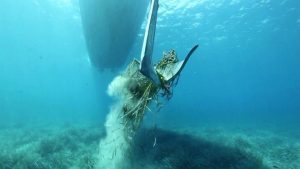 ©MENORCALDIA
©MENORCALDIA
La posidonia se encuentra en grave peligro de desaparición. Este problema afecta, especialmente, a las Islas Baleares, con 55795 hectáreas.
Las praderas de posidonia mediterránea, creadoras de oxígeno en el fondo marino, se enfrenta a numerosas amenazas como el amarre de los barcos que las barre con sus anclas y cadenas.
Más de la mitad del oxígeno que respiramos proviene del mar, y una de las fuentes creadoras de oxígeno con un área de 50.000 kilómetros cuadrados es la posidonia. Este pulmón del Mediterráneo crea hasta cinco veces más oxígeno que la selva amazónica.
El turismo irresponsable con el medio ambiente y la contaminación de las aguas -causada, por ejemplo, por un mal tratamiento de aguas residuales son otras amenazas a las que se enfrenta la posidonia. Por otro lado, el amarre de los barcos a través de sus cadenas y anclas barren el fondo marino dañando gravemente la planta acuática.
En este vídeo se pueden visualizar imágenes reales sobre cómo los amarres de los barcos afectan a este patrimonio natural.
A estas amenazas, se le suma el hecho de que el crecimiento es muy lento, lo que dificulta su recuperación. Un hueco de un metro cuadrado tardaría 50 años en taparse completamente.
El desarrollo urbanístico también es un riesgo que afecta de manera directa a la posidonia mediterránea ya que, al retroceder la superficie, también se produce un retroceso de la planta debido a la presencia de construcciones, diques, puertos y embarcaciones.
Uno de los pulmones acuáticos más grandes del planeta se encuentra en peligro por muchos de los riesgos que afectan a mares y océanos en general y, de forma específica, a la flora y fauna que los habitan.
__
POSIDONIA IN DANGER
Posidonia is in serious danger of disappearing. This problem particularly affects the Balearic Islands, with 55795 hectares.
The Mediterranean posidonia meadows, creators of oxygen on the seabed, face numerous threats such as the mooring of ships that sweep them away with their anchors and chains.
More than half of the oxygen we breathe comes from the sea, and one of the oxygen-creating sources with an area of 50,000 square kilometers is the posidonia. This Mediterranean lung creates up to five times more oxygen than the Amazon rainforest.
Environmentally irresponsible tourism and water pollution – caused, for example, by poor sewage treatment – are other threats facing Posidonia. On the other hand, the mooring of ships through their chains and anchors sweep the seabed seriously damaging the aquatic plant.
This video shows real images of how boat moorings affect this natural heritage.
In addition to these threats, there is the fact that growth is very slow, which makes recovery difficult. A gap of one square meter would take 50 years to completely fill.
Urban development is also a risk that directly affects the Mediterranean Posidonia because, as the surface recedes, the plant also recedes due to the presence of buildings, dykes, ports and boats.
One of the largest aquatic lungs on the planet is endangered by many of the risks that affect seas and oceans in general and, specifically, the flora and fauna that inhabit them.
__

